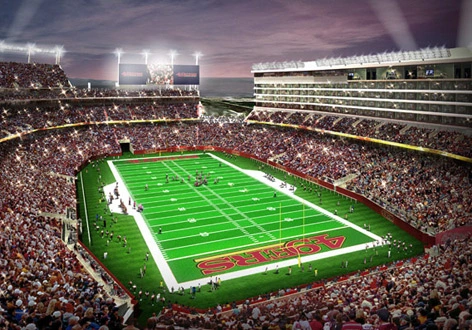
San Francisco 49ers
The work we’ve done as lead real estate and corporate counsel for the San Francisco 49ers and its affiliates includes large, complex, and seemingly impossible deals: everything from an ownership reorganization to a major real estate and land use project to advising on complex property and income tax and intellectual property issues. Our representation of the 49ers over the past 10 years has allowed us a unique opportunity to play a significant role in a major public/private partnership from inception to ground-breaking to operations.
Our firm’s primary project for the 49ers was the new $1.3 billion, 68,000-seat Levi’s® Stadium in Santa Clara. Coblentz led the negotiation with the City of Santa Clara and the Santa Clara Stadium Authority, owner of the new stadium. The development, a public/private partnership between the 49ers and the City of Santa Clara, presented particularly complex entitlement, financing, and other real estate issues. For example, the 49ers were committed to a public vote on the stadium, which ultimately passed with nearly 60 percent of Santa Clara citizens showing support. In addition, development of the stadium required the 49ers and the Santa Clara Stadium Authority to obtain an $850 million construction loan from a consortium of banks, led by Goldman Sachs.
The firm’s work has included assisting the 49ers in all aspects of the transaction, including the complex structuring of the deal, securing of land use and other entitlements, the negotiation and drafting of the disposition and development agreement, the stadium lease, certain of the construction-related agreements, and many other of the ancillary documents. The more than $1 billion construction financing for the stadium closed in March 2012, the 49ers hosted their first games in the stadium in 2014, and hosted Super Bowl 50 in 2016. It is the first new professional football stadium constructed in California in 50 years.
The firm’s litigation group represented the 49ers in related election and environmental litigation and business matters. In Cedar Fair v. City of Santa Clara, we prevailed in a CEQA action challenging the proposed stadium. Cedar Fair, an adjacent property owner, argued that the preliminary stadium term sheet entered into by the 49ers and the City of Santa Clara constituted a project approval, which having occurred before the environmental review was complete, violated the principles laid down by the California Supreme Court in Save Tara v. City of West Hollywood. The case was dismissed on demurrer, a ruling that was affirmed by the Court of Appeals. The decision is one of only three that have interpreted the Supreme Court’s ruling in Save Tara, and it provides the most detailed guidance available to developers and public agencies engaged in negotiations that are subject to CEQA review.